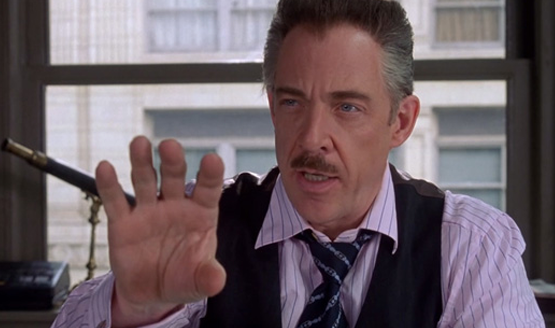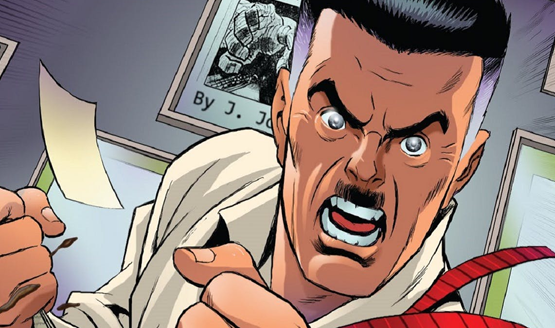Marvel’s Spider-Man has a major problem. No, it’s not the rote open-world formula. Insomniac’s Spider-Man fantasy pretty effectively covers that up, and I already talked about that in my review. The one thing that persistently bothered me was Insomniac’s shallow treatment of a longstanding Spider-Man character. Marvel’s Spider-Man puts J. Jonah Jameson in the role of “Alex Jones parody” for the duration of the game, but the joke is rapidly lost to a problematic depiction of the character that isn’t nearly as nuanced as he has the potential for.
J. Jonah Jameson has always been something of a parody in the Spider-Man comics. The character was created back in March 1963, first appearing in The Amazing Spider-Man #1. Stan Lee created Jameson as a mirror of himself, and other Spider-Man writers have backed that assertion. Various iterations of the character have had slightly different takes, whether it’s different comic arcs, Spider-Man films, or other portrayals. Perhaps the most well-known depiction of Jameson has been that of J.K Simmons, who played the Daily Bugle’s Editor-in-Chief in Sam Raimi’s Spider-Man trilogy. Simmons has also provided his voice to JJJ in a number of animated depictions.
Most well known for his disdain for Spider-Man, Jameson bought photos of Spider-Man from Peter Parker for the purpose of defaming the superhero’s character. He’s often loudly proclaiming that Spider-Man is a menace to anyone who will listen, and using the paper to spread his own views on Spidey’s brand of vigilante justice. Yet he’s always had a gruff caring for Peter as something of a son.
J. Jonah Jameson may be a parody, but he’s also been the grounded voice of reason to make readers and viewers think. Yes, Spider-Man is a hero, but he has a tenuous relationship with the law, at best. Some of the points that Jameson brings up provide a foil to the heroics that vigilantes like Spider-Man perform, where we turn a blind eye to how they skirt around normal process. He allows us to question our heroes a little bit. Whether he’s right or wrong isn’t what’s important. It’s that he opens the door to the question being asked.
Despite his outrageous outbursts, there’s always been a level of respect held for Jameson. As the Editor-in-Chief of the Daily Bugle—and in later arcs, Mayor of New York—the comics have almost always given his role a seat of power at the table, to make sure that people take his points somewhat seriously. He has to garner that kind of respect for readers to legitimately question if Spider-Man is entirely in the right.
And then Insomniac took Jameson and made him into Alex Jones.
If you’re unfamiliar with Alex Jones, he’s the host of the radio show InfoWars and a conspiracy theorist, regularly allowing himself to get worked up to the point of shouting angrily about those conspiracy theories. Many of his points devolve quickly into complete madness (he maintains that the government has access to “weather weapons” that can geo-engineer storms and other weather anomalies at will, and that multiple mass shootings have been faked for a political agenda).
Jones has been parodied in a number of places, including by various comedians and even by The Late Show’s Stephen Colbert, but perhaps there’s no greater parody of Jones than Jones himself. This is why it’s so disappointing to see J. Jonah Jameson reduced to an angry, shouting radio personality with no kind of character arc or development.
Threat or Menace?
Marvel’s Spider-Man’s portrayal of Jameson just fails to meet the stature of his character. On hearing the first morsel of Just the Facts with J. Jonah Jameson while swinging around the open world, my immediate thought was “Oh, how the mighty have fallen.” The once respected indignance of the fiery character was reduced to angry voice clips on a fake radio show. He’s played for laughs, but the laughs don’t last long.
The audio segments follow major events in the game, with Jameson giving his own take on how they went down and taking calls from various people. Occasionally, he’ll give that valuable nugget where I would think, “You know, he’s got a point there,” but most often he was left to stew, rage, contradict his callers, and even outright call them liars. J. Jonah Jameson became a conspiracy theory peddler, dealing in fear mongering and ridiculous assertions about more than just his disdain for the Spider.
I’m not against parody, and Jameson has always walked a line dangerously close to slipping into the kind of rage-filled conspiracy rants that Jones is known for, but Insomniac drip fed this persona throughout the game. In total, there are 81 Jameson clips that play, for more than an hour’s worth of Jameson’s angry dialogue. “A webbed pervert walks among us!” as Jameson asserts that Spider-Man is a peeping tom. At one point he starts on a rant about how Spider-Man is going to start eating people, like a real spider might. It goes on. And on. And on. I went from amused, to annoyed, to downright upset that I was forced to keep listening to them. And then, if you so choose, the entire catalog of audio clips is available to listen to again right in the menu.
I don’t choose to listen to Alex Jones. I don’t want to listen to Alex Jones. I don’t want to listen to extended parodies of Alex Jones. If Insomniac was going to give J. Jonah Jameson more than an hour of dialogue in the game, they could have given his character a far more interesting arc over that time. Otherwise he should have been left to be an Easter egg or small reference, rather than an entire collectible set of angry rants that you don’t have any choice in collecting or not.
Look, I get it. This is where the world is now. Insomniac wanted to give Jameson a part that felt relatable to real life, but they took a character that had the opportunity to pose some really dynamic questions and instead made him a meme. Instead of being a central part of Peter’s life, he was an audio personality that had lost all the respect he once held. J. Jonah Jameson can be interesting and nuanced beneath his brash exterior. Marvel’s Spider-Man never explores that nuance, and that was a decision that left the once respected character shallow, angry, and brutish.
For the record, in current comic arcs, J. Jonah Jameson is actually working with Spider-Man after learning his secret identity, reconciling his hatred for the Spider with his longtime views of Peter as a son. That’s a deep character. Marvel’s Spider-Man is supposed to take place eight years after Peter got his powers, yet one of the most prominent and potentially interesting characters was left to rot behind a conspiracy theory radio show.
This article is entirely the opinion of the author and does not necessarily reflect the views of PlayStation LifeStyle or its staff.
Essential Reading
- Composing Peter Parker: The Music of Marvel’s Spider-Man with Composer John Paesano
- Spider-Man PS4 Dialogue Was Recorded Twice, Dynamically Switches Between Normal and Exerted
- Here Are a Few Easter Eggs in Marvel’s Spider-Man
Marvel's Spider-Man PS4 Suits Ranked September 2018
-
Marvel's Spider-Man PS4 - All 28 Suits Ranked
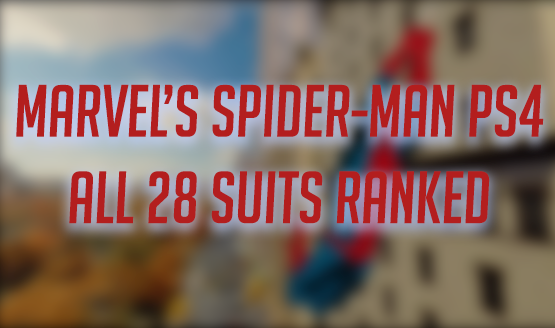
There are 28 suits in Marvel's Spider-Man PS4, some far better than others. Using the photo mode, critical analysis, and our good ol' fashioned opinions, here are all 28 Marvel's Spider-Man PS4 suits ranked from worst to best.
-
#28 ESU Suit
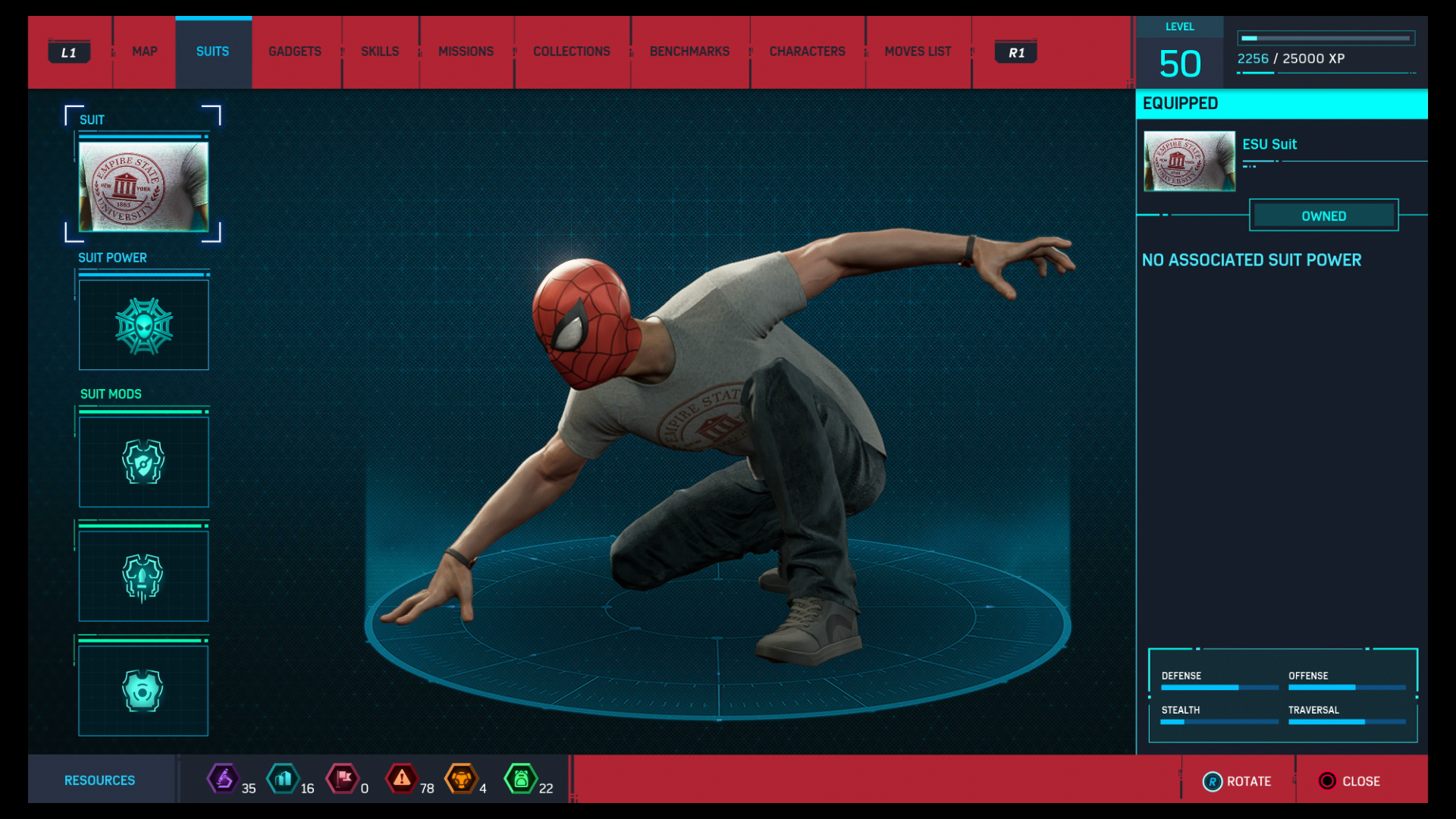
Apart from being one of the most boring suits in the game comparatively, the slap in the face is that this is the reward for getting all of the secret photo ops hidden around the city, which will probably make it the final suit you unlock. I was kind of expecting something a little more for my efforts than just honoring Peter Parker's alma mater.
-
#27 Classic Suit
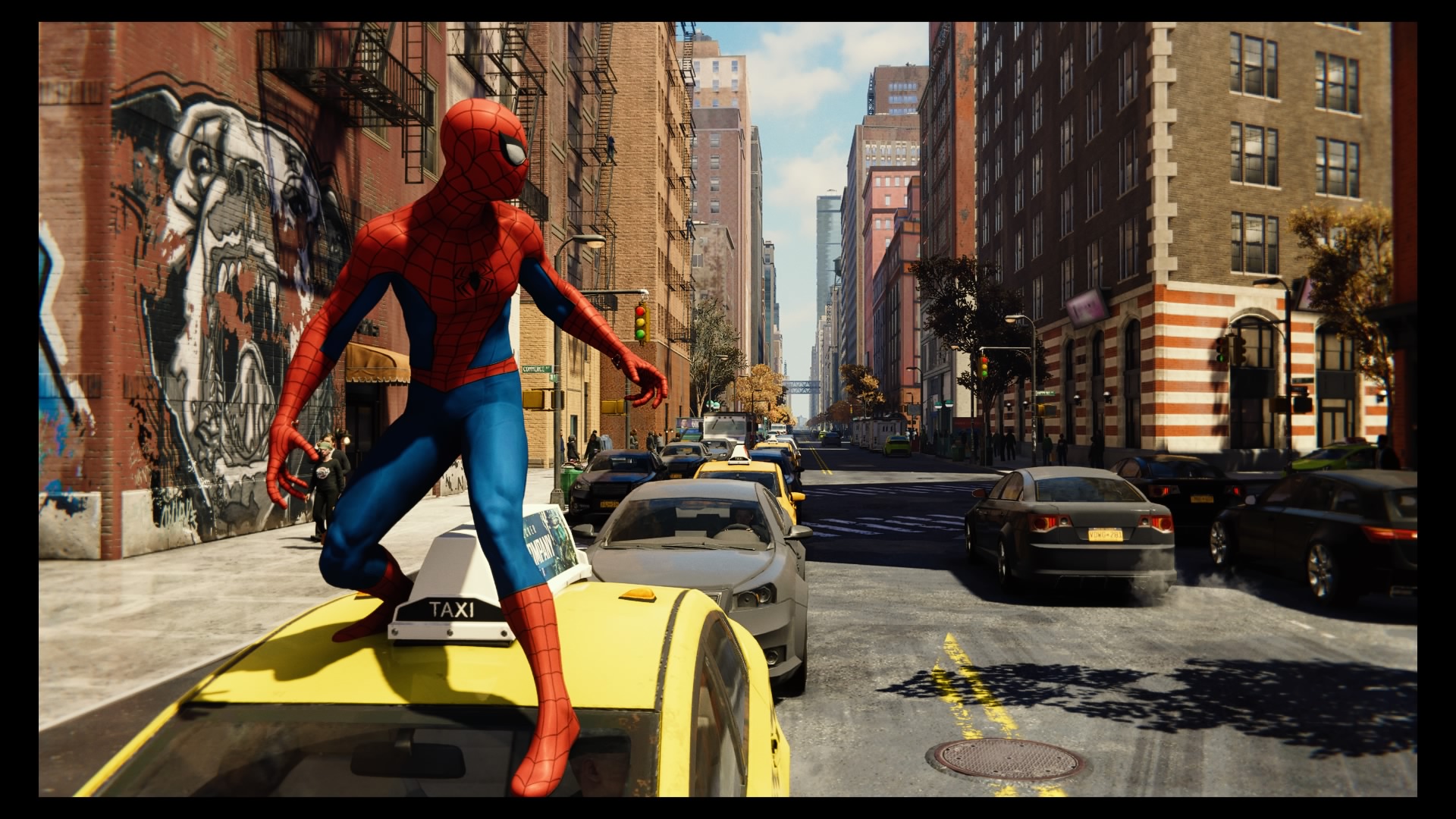
Now, there's nothing wrong with the classic Spidey suit per se, but it just can't compare with a lot of the other unique suits on this list. We put it low on the list simply because it lacks the flair and/or humor of the other suits.
-
#26 Electrically Insulated Suit
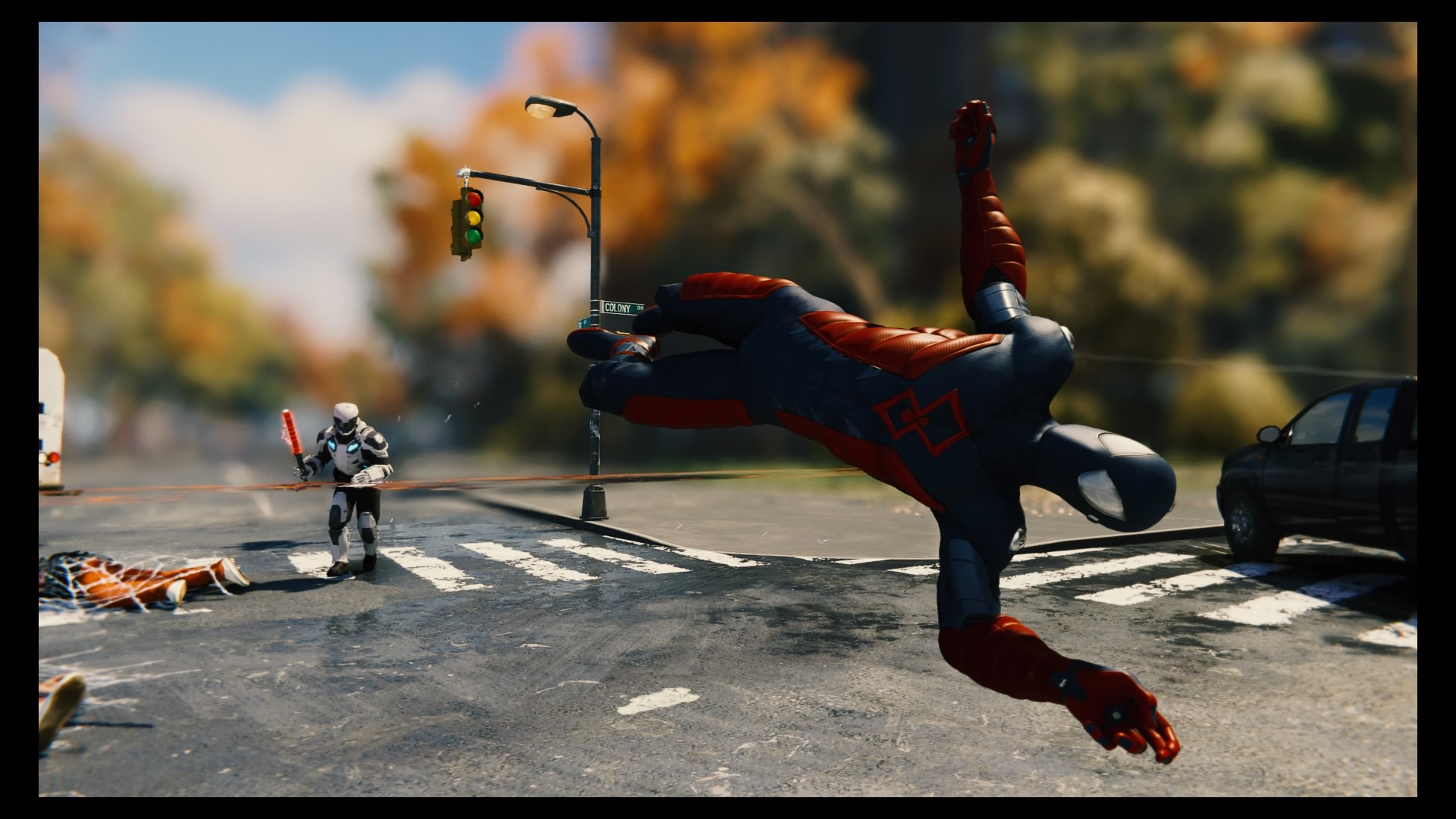
This suit was designed by Peter in Amazing Spider-Man #425 to combat Electro and protect himself from his electric attacks. While its function may have saved Peter's bacon on a number of occasions, the hero clearly wasn't thinking of fashion when he designed this fairly ugly suit.
-
#25 Spider Armor - MK III Suit
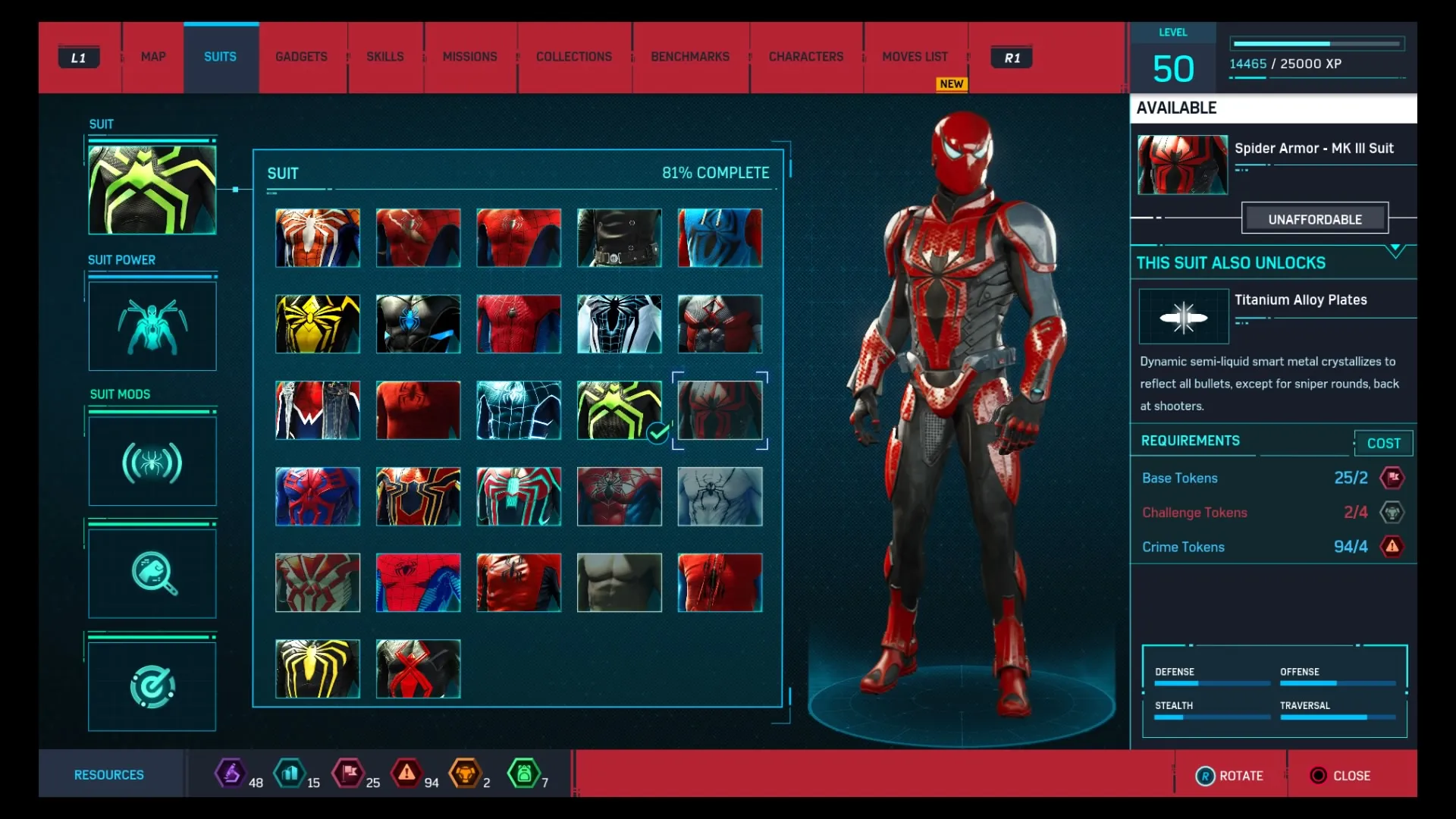
Created in Amazing Spider-Man #682, the Spider Armor MK III has a ton of features packed into its beefy shell, none of which are actually usable in Marvel's Spider-Man PS4. The mask is a little bit reminiscent of DC's Deathstroke, and it's a bit too bulky to be our favorite.
-
#24 Spider-Man 2099 White Suit
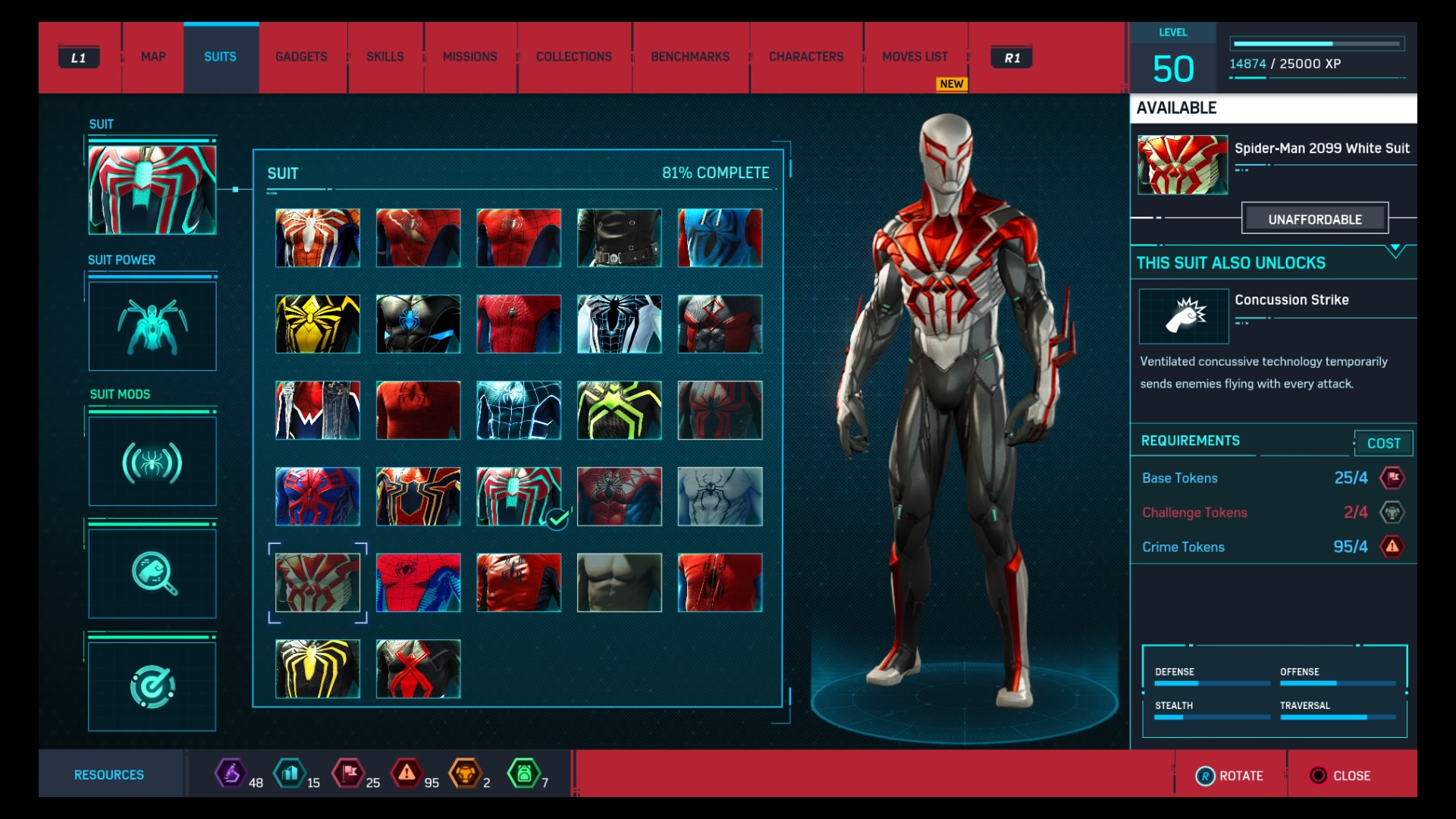
While a huge fan of Spider-Man 2099 (Miguel O'Hara), and the theory behind his updated white suit, its appearance in-game is little more than some shiny power armor without some of the really cool visual features that make it special in the comics, like the red glow and ability to change colors. It still looks pretty cool, but it's not among our favorite suits in the game.
-
#23 Stark Suit

The Stark Suit is a special nod to the suit that Peter was given by Tony Stark (Iron Man) in the Captain America: Civil War MCU film, and subsequently used in Spider-Man: Homecoming. While a cool nod to more modern representations of the character, it's not a particularly spectacular suit among the rest of the pack.
-
#22 Wrestler Suit

When Peter Parker first discovered he had powers, he donned a mask and dove headfirst into an underground wrestling arena. This is the costume that he wore in that fated moment (where Uncle Ben would be killed shortly after). It's not the slickest looking suit in the game, but it's humorous and unique.
-
#21 Velocity Suit

The Velocity Suit is completely new for Marvel's Spider-Man PS4, and it's designed for speed. It's got a pretty cool futuristic look to it, with glowing accents and an overall sheen.
-
#20 Advanced Suit

The Advanced Suit is the main suit for Marvel's Spider-Man PS4. It was created by Insomniac specifically for the game and has an interesting origin story with who helps Peter to build it. Most notably, it has new white accents that really pop on top of the classic Spidey look.
-
#19 Dark Suit
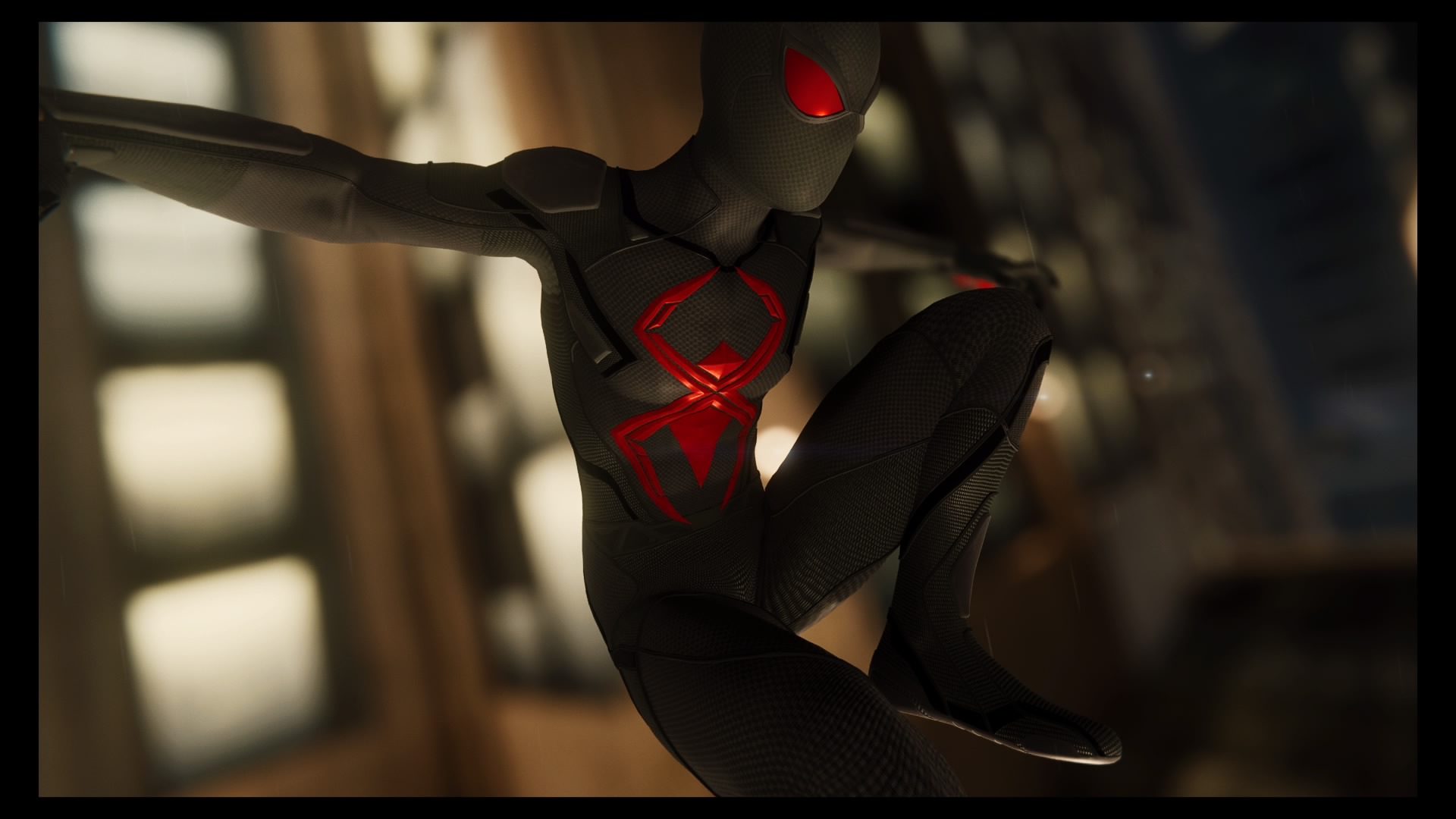
Earned for completing all of the Black Cat photo-op missions in the game, this is a stealth suit with a red spider and eyes. It looks pretty cool, but it still doesn't rank among our most favorite Spidey suits in the game.
-
#18 Spider Armor - MK II Suit
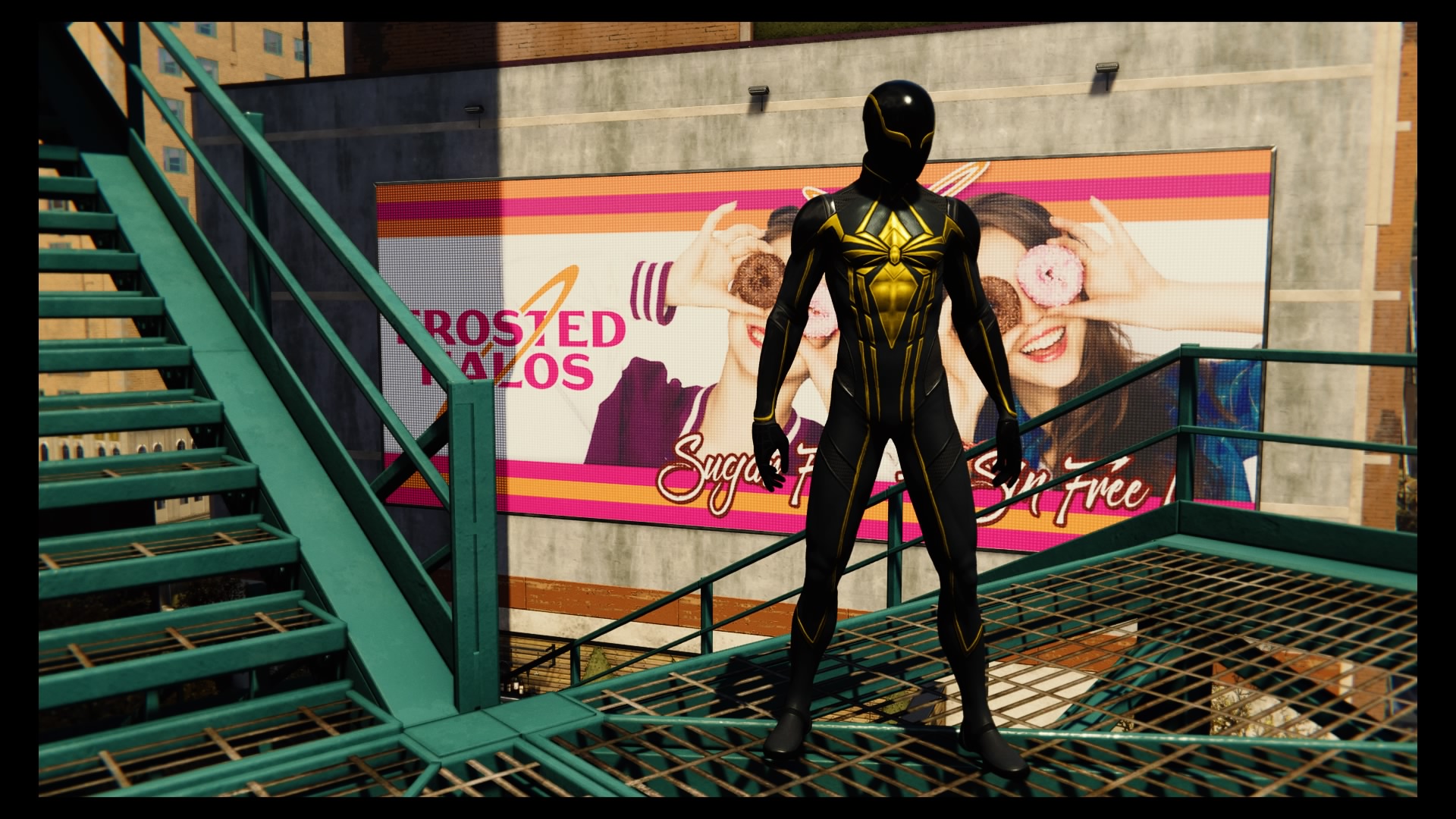
How is it that the suit that came before the MK III armor looks better than that bulky mess? The MK II Spider Armor has a really cool black and gold sheen, keeping Spidey's narrow frame while giving him bullet proof plating.
-
#17 Secret War Suit
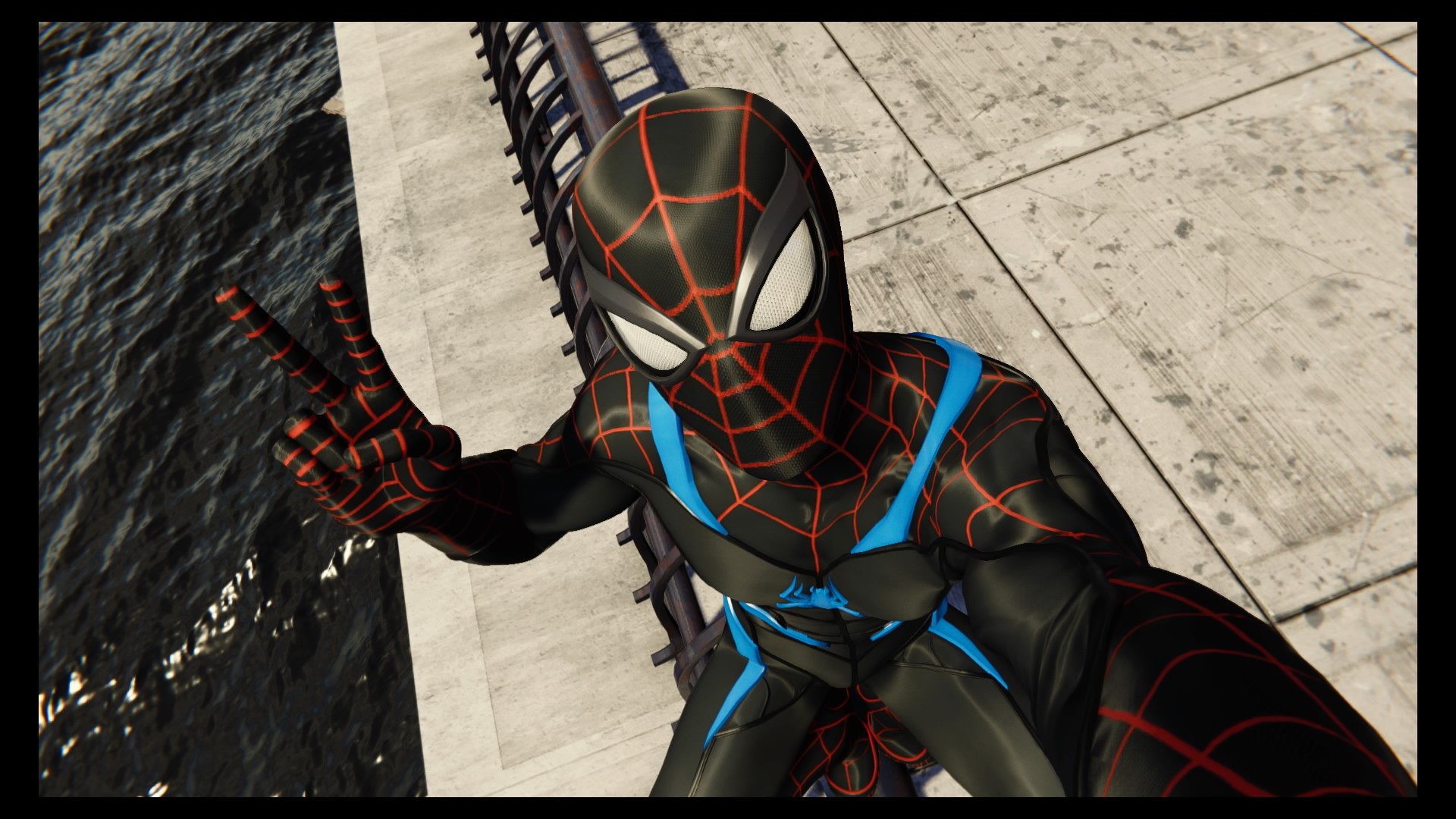
Not to be confused with his Secret Wars symbiote suit created in the '80s, Spidey's Secret War suit comes from the 2004-2005 Marvel crossover event, featuring a unique design of red webbing on black material, with blue accents.
-
#16 Spider Armor - MK IV Suit
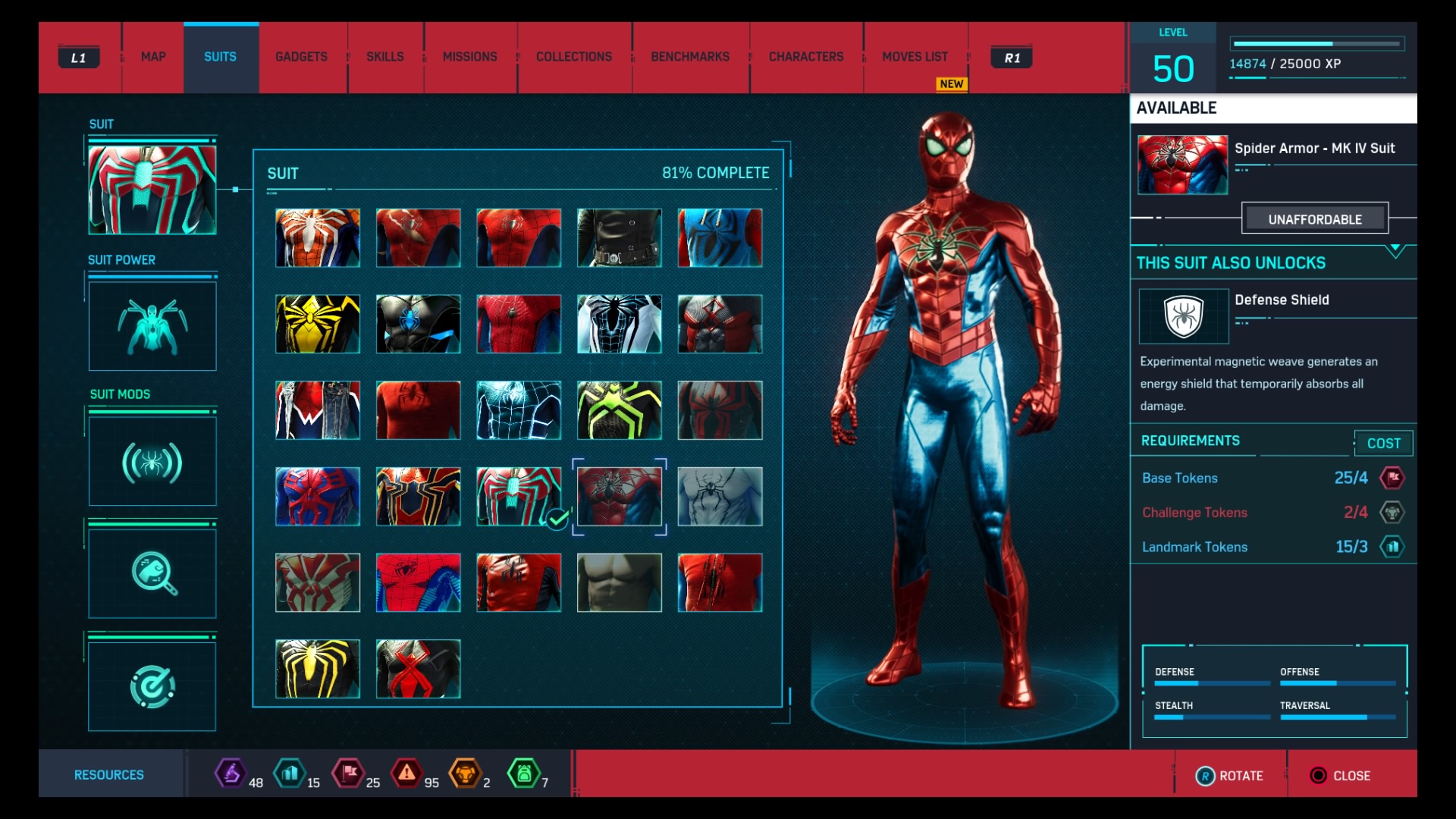
Bythe Spider Armor MK IV, it looks like Peter just wanted to go with his Classic Spider Suit design with an armored plating over the top of it, so what we get is effectively shiny metallic Spider-Man. Who doesn't love shiny?
-
#15 Classic Suit (Damaged)
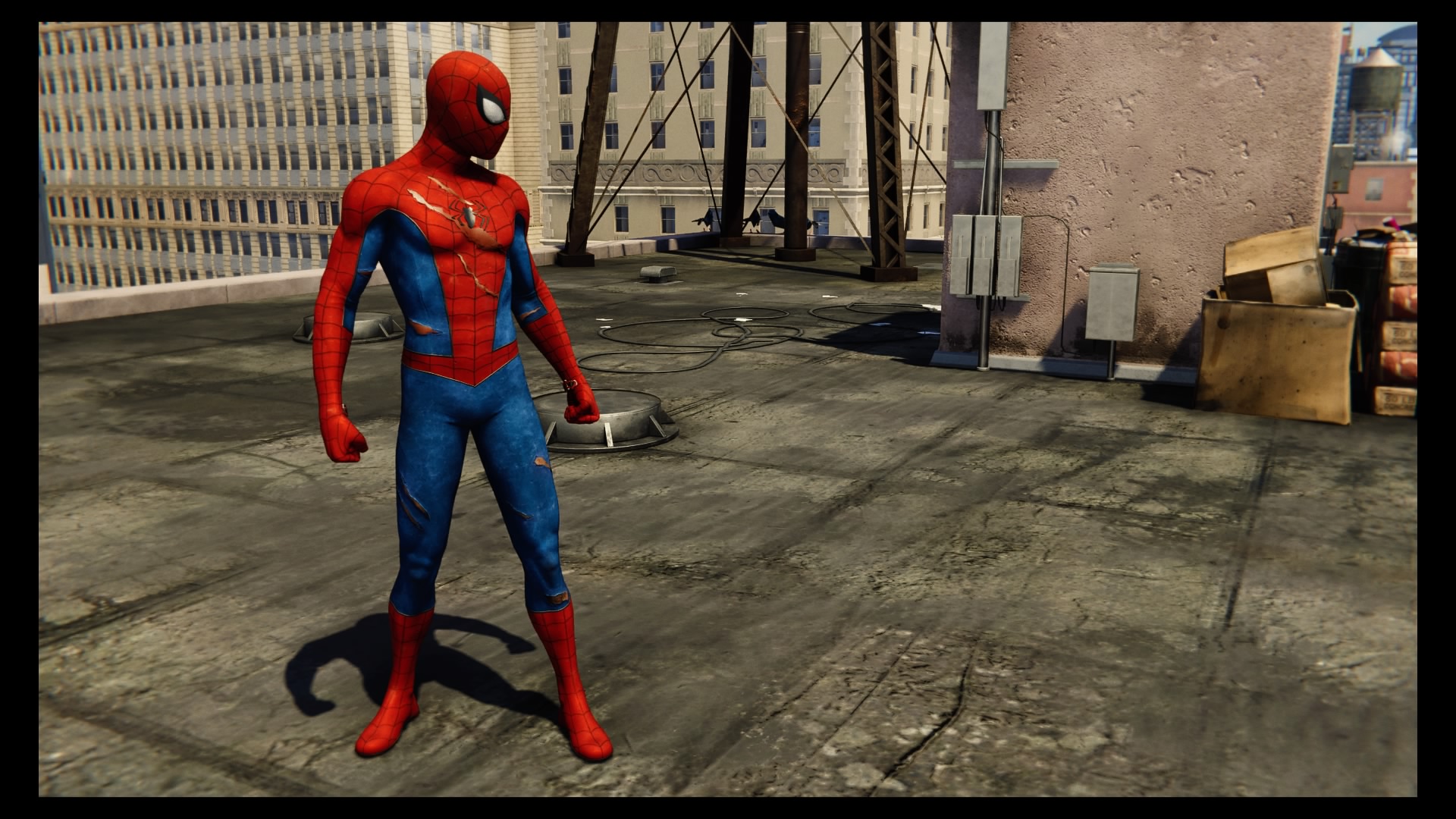
While we may not have been too keen on the clean Classic Suit, the damaged version of the suit tells a story through it's ripped fabric. This is a hero who has been through some stuff and only barely come out on the other side. We don't always need to see our heroes in their pristine costumes. Sometimes a bit of damage is good!
-
#14 Homemade Suit
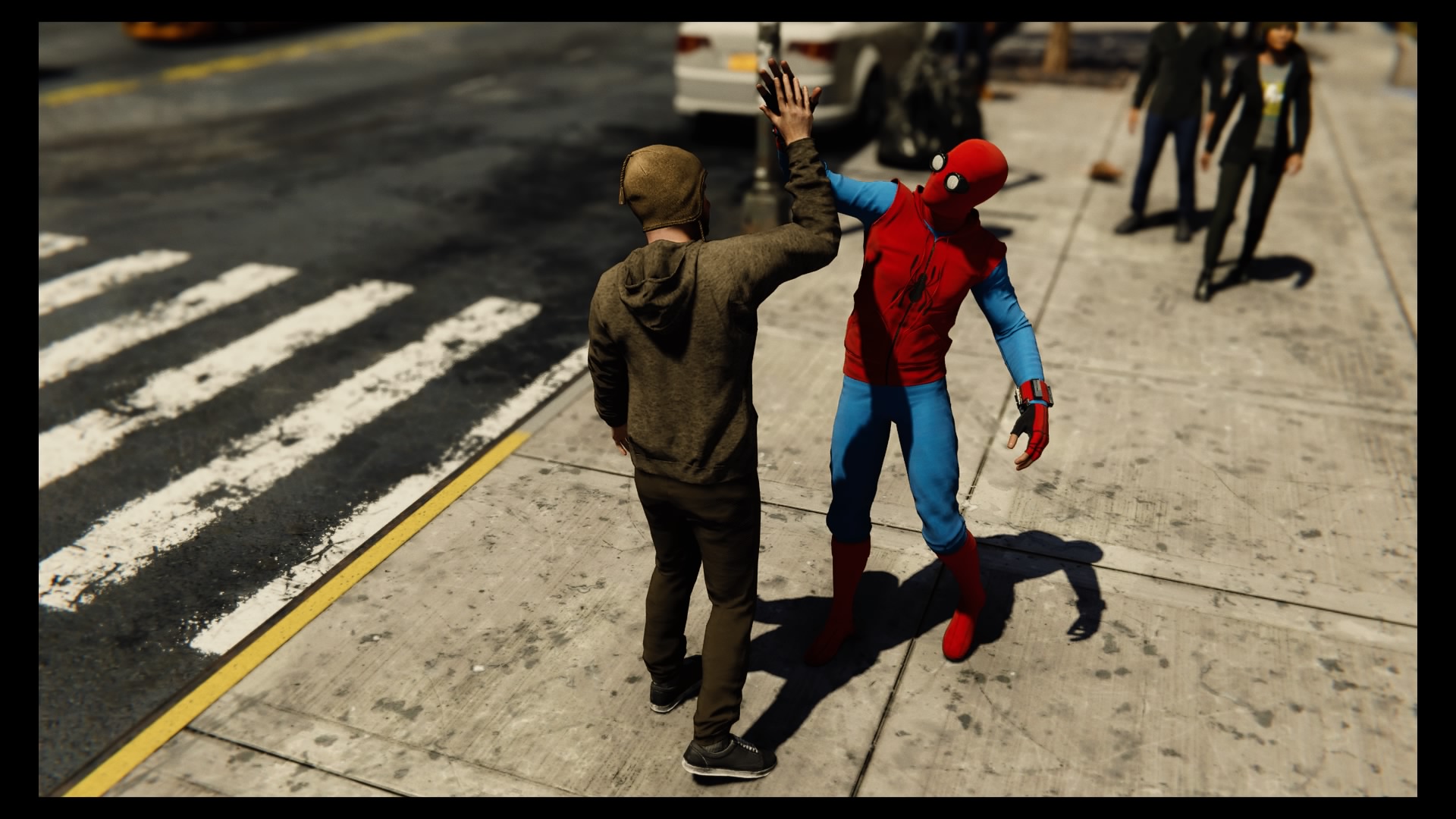
More for laughs than anything else, this blue sweatpants, red socks, goggles combo is what Peter first wore in Spider-Man: Homecoming as he started his superhero career.
-
#13 Undies

Making a little bit more sense once you finish the game, the Undies Suit (or lack of suit) is your reward for finishing the entire game 100%. Get it done before the DLCs come out, and just maybe Peter can be super awkwardly in his skivvies for all of the cutscenes. Count me in.
-
#12 Anti-Ock Suit
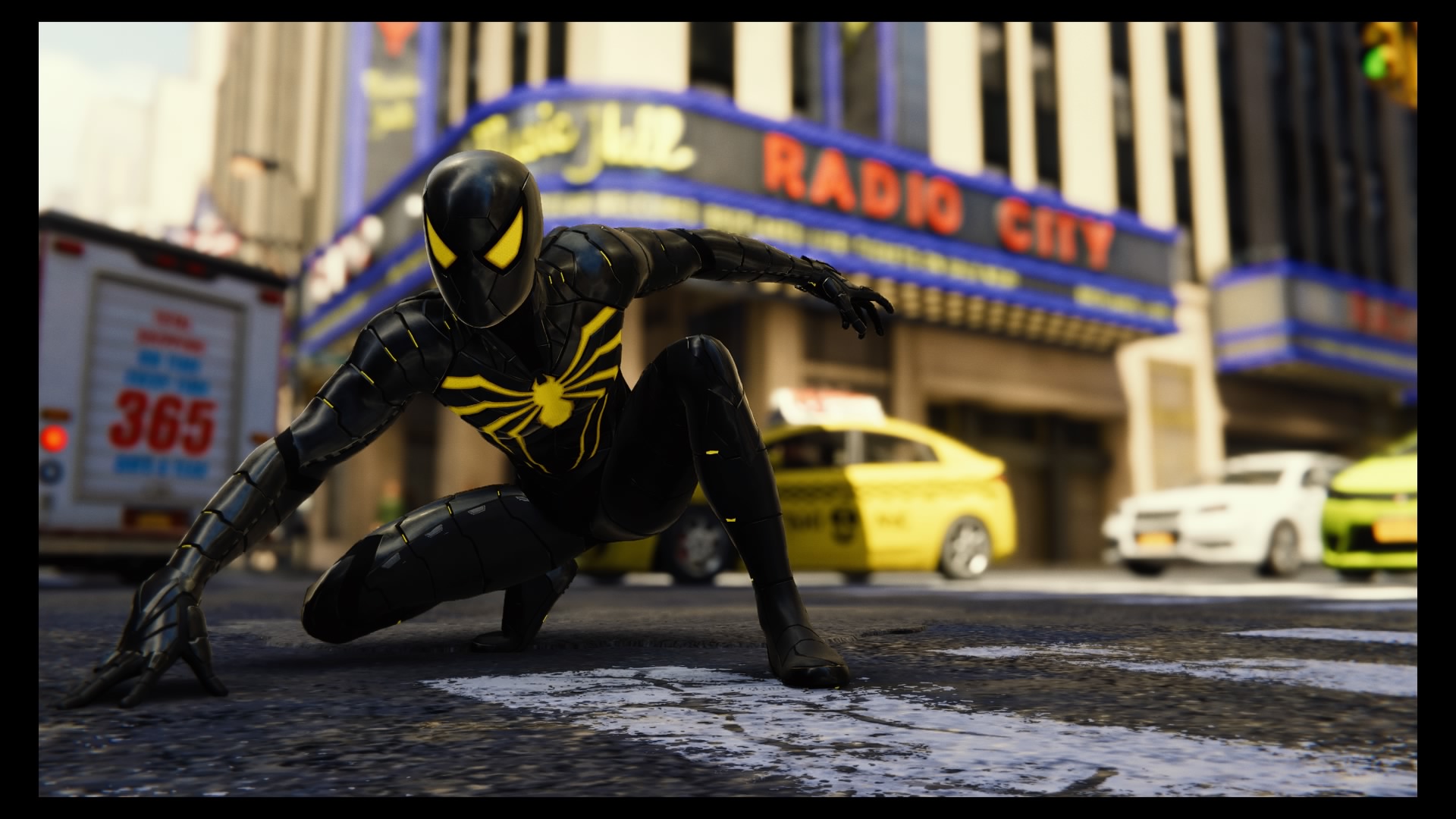
Another exclusive for Marvel's Spider-Man PS4, this costume plays into the campaign, and we think that Insomniac did a pretty great job with the design.
-
#11 Stealth (“Big Time”) Suit
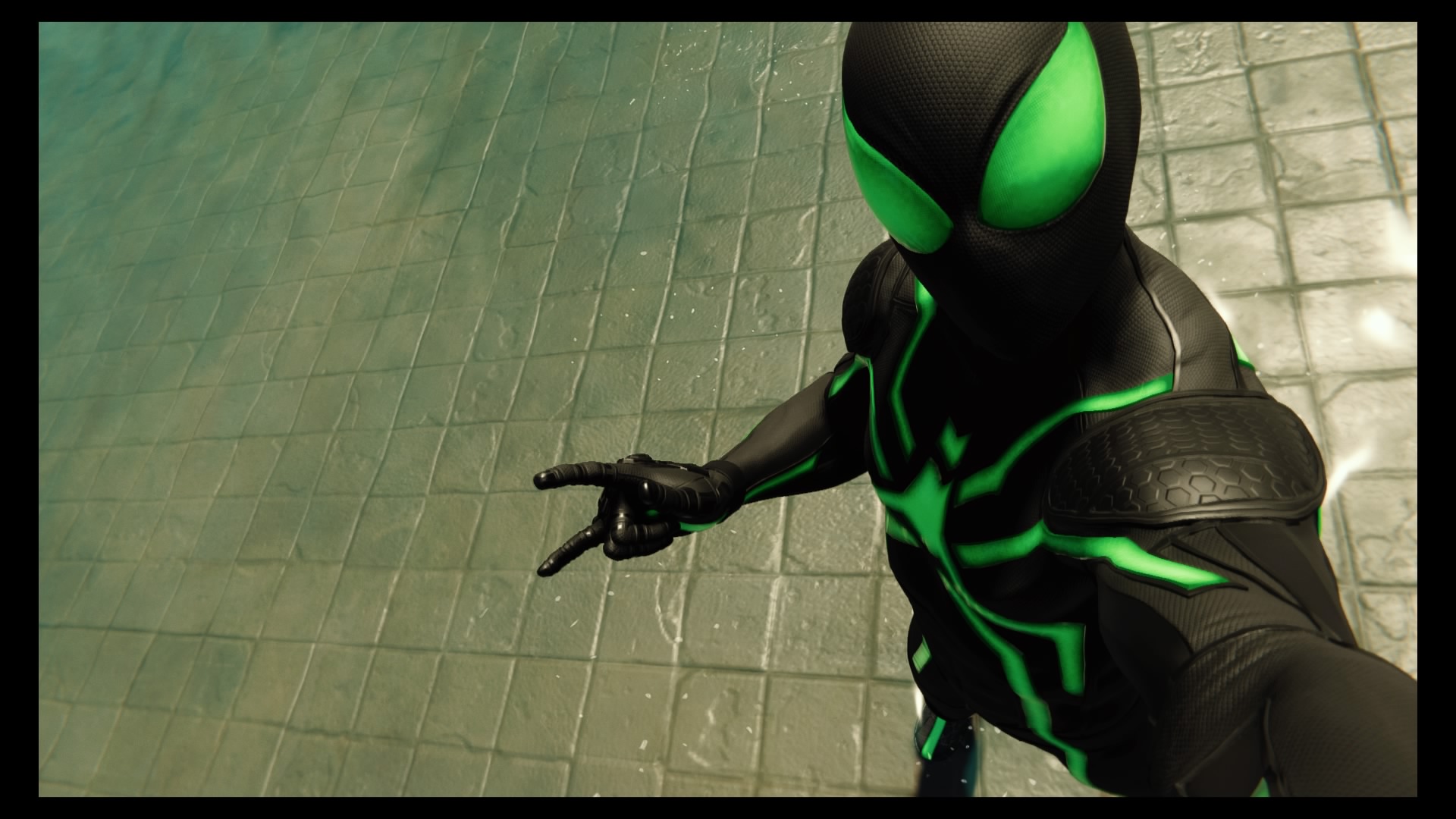
In the comics, this suit actually changes its accents from red to blue to green depending on which stealth mode it is in. Marvel's Spider-Man PS4 locks it into its neon green configuration, but it still looks pretty cool to swing around New York City with.
-
#10 Fear Itself Suit
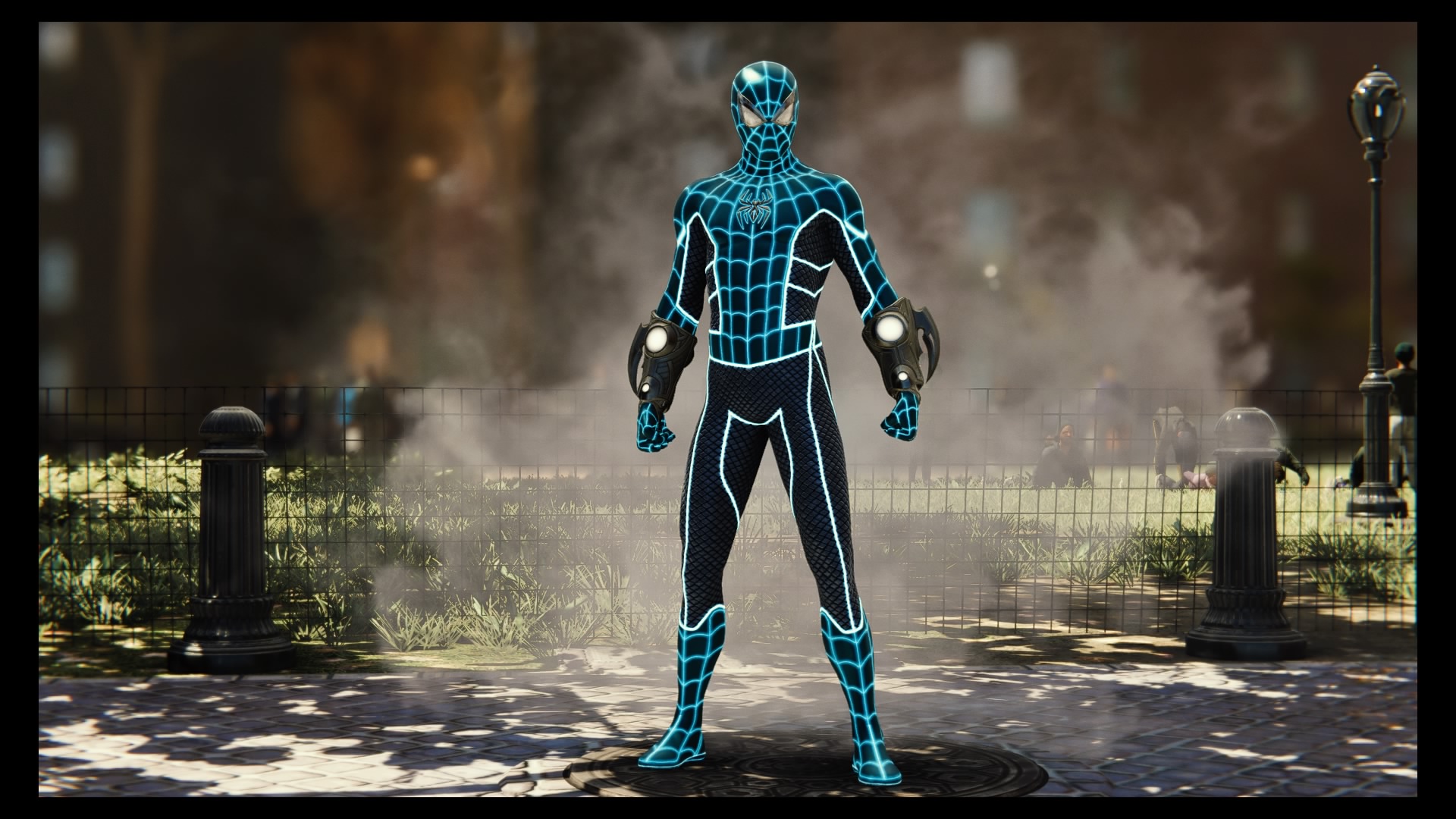
Here we go! Top 10! For number 10, the Fear Itself Suit starts our list. During this comic arc, Tony Stark and the Dwarves of Nidavellir made a number of suits for various heroes and this was Spider-Man's. The aesthetic really brings across the whole Fear Itself storyline, which is about a villain who creates fear in Marvel heroes.
-
#9 Spirit Spider
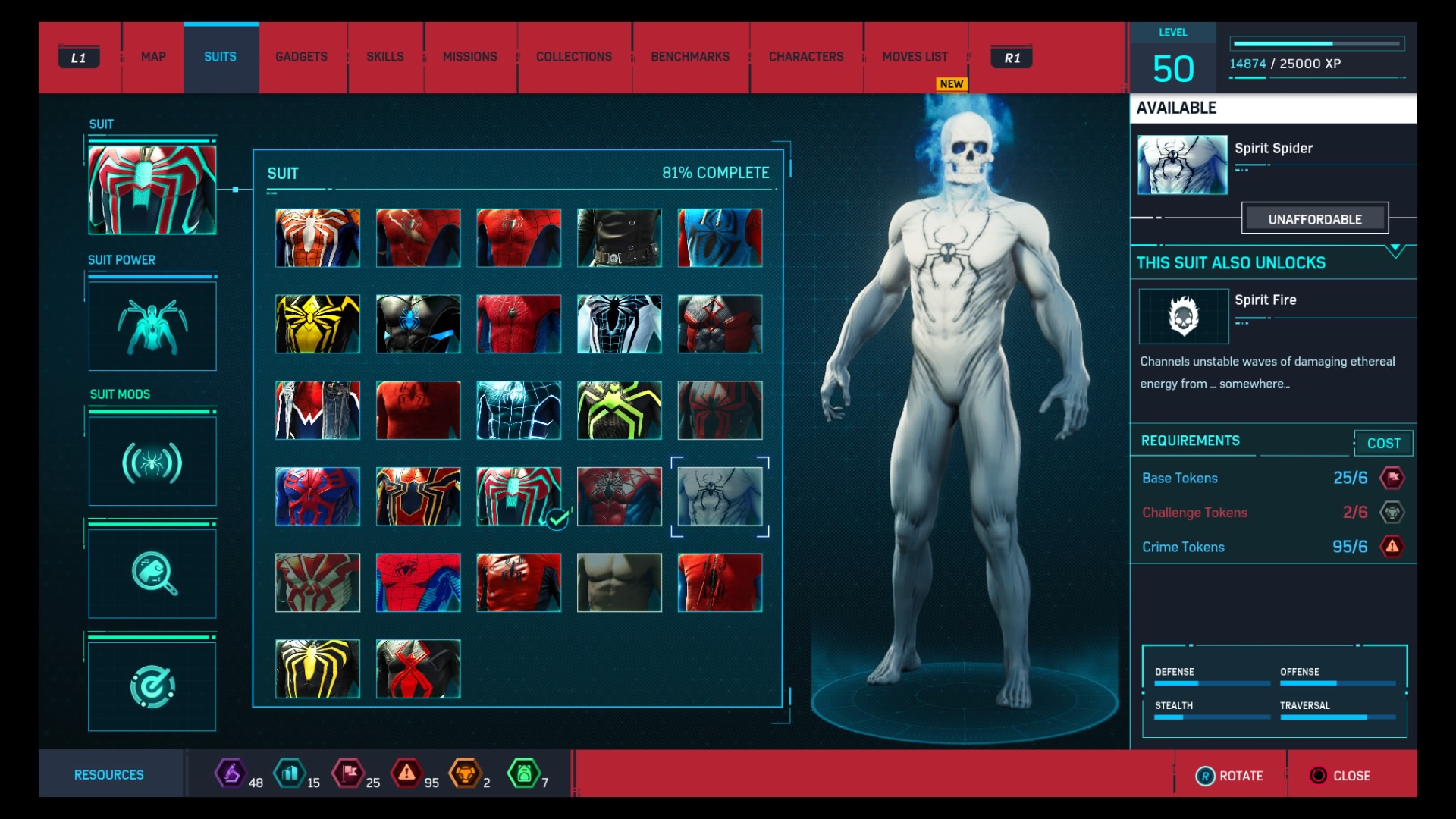
What if Spider-Man and Ghost Rider crossed over? While that's not exactly what happened here, an alternate universe version of Spider-Man did try to absorb all of the other Spider-Men before having his own spirit trapped in Hell where it got saddled with dark powers similar to what gives Ghost Rider his flaming skull head. Ghost Spider!
-
#8 Spider-Man 2099 Black Suit

I just love the look of the Spider-Man 2099 Black Suit, even if it is decidedly blue. Peter Parker himself doesn't actually where this one. That honor belongs to a future Spider-Man, Miguel O'Hara. It's one of the most visually striking suits in the game while honoring some classic Spidey stories.
-
#7 Negative Suit
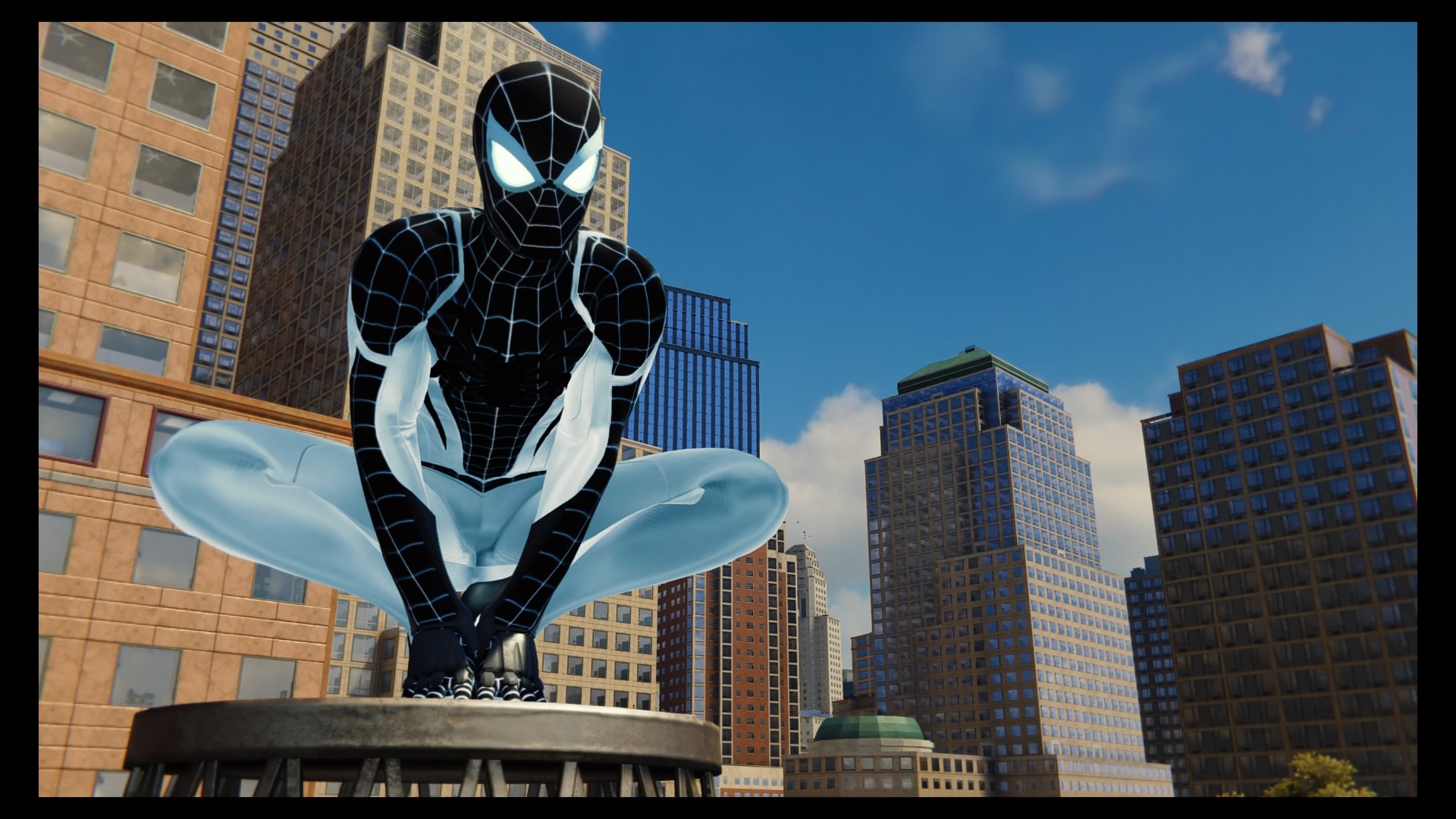
Despite fighting Mister Negative in the game, this suit actually has a history from when Spider-Man went into the Negative Zone. The Negative Zone has no color, so the suit transformed to match, and Insomniac designed it with their own special flair to match the look of Mister Negative and his Demons in the game.
-
#6 Spider-Punk
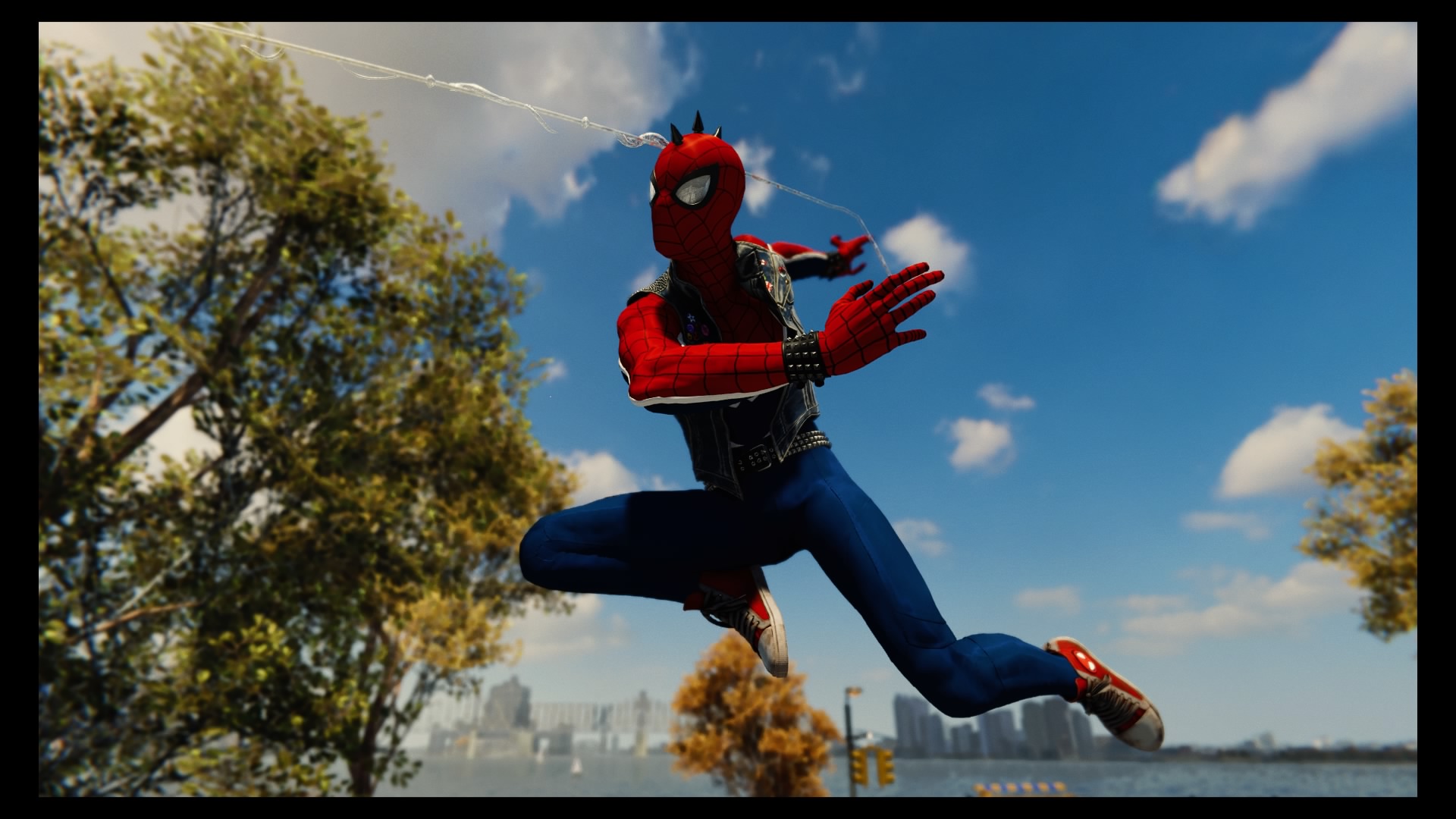
Spidey already shirks authority, throwing quip after quip around and skirting the edge of the law (as most heroes do). In reality, he's one step away from being a punk, so this suit really speaks to his brand. Spider Punk is not a Peter Parker outfit, but that of Hobart Brown, an activist fighting back against the man and an oppressive government in a way that only punks can.
-
#5 Scarlet Spider Suit
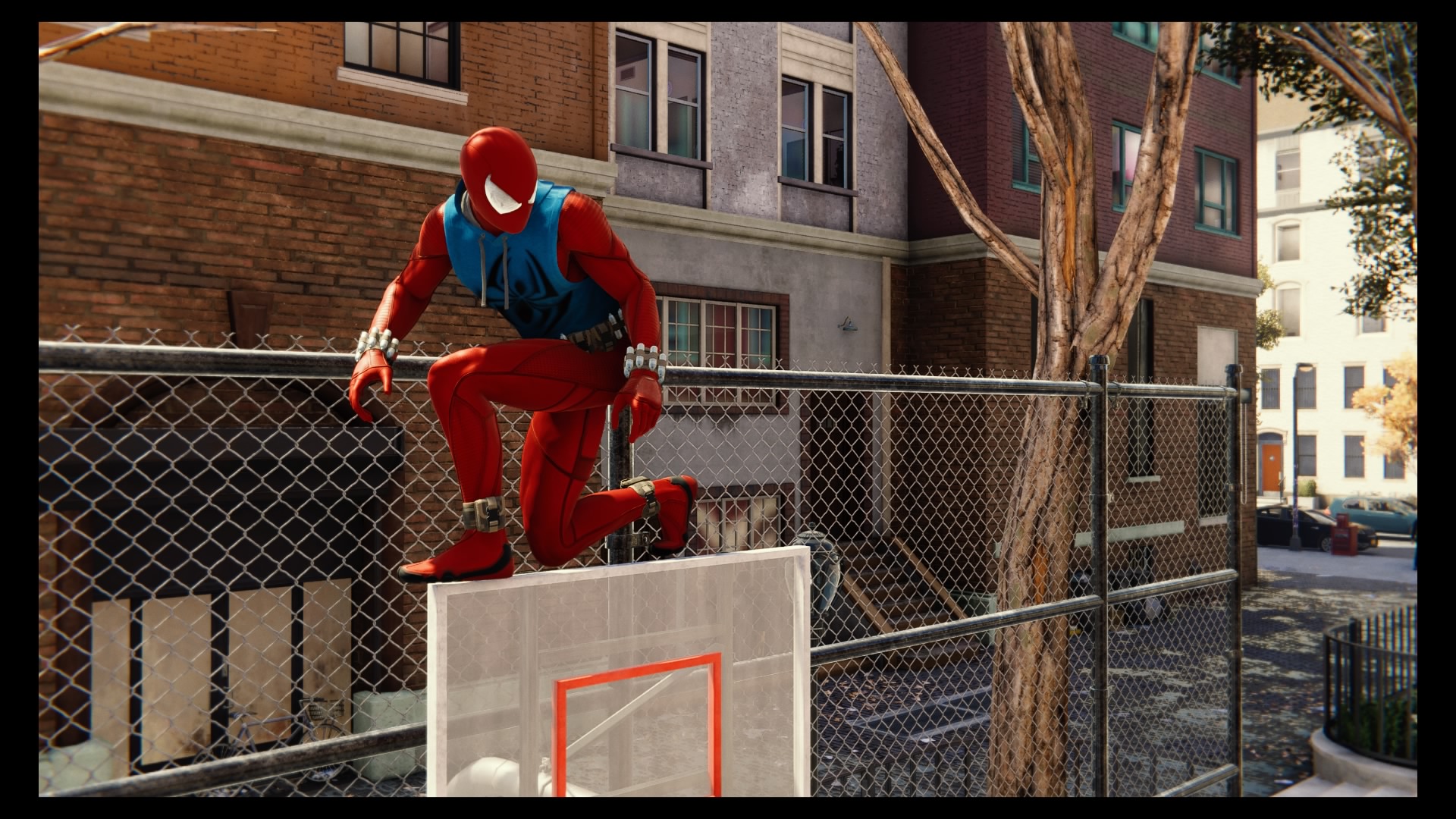
Something about the Scarlet Spider seems so cool and relatable. He wears a skintight red suit, but a sleeveless hoodie over the top of it. While Peter Parker did become the Scarlet Spider at one point, this version is Ben Reilly, a clone of Spider-Man.
-
#4 Iron Spider Suit
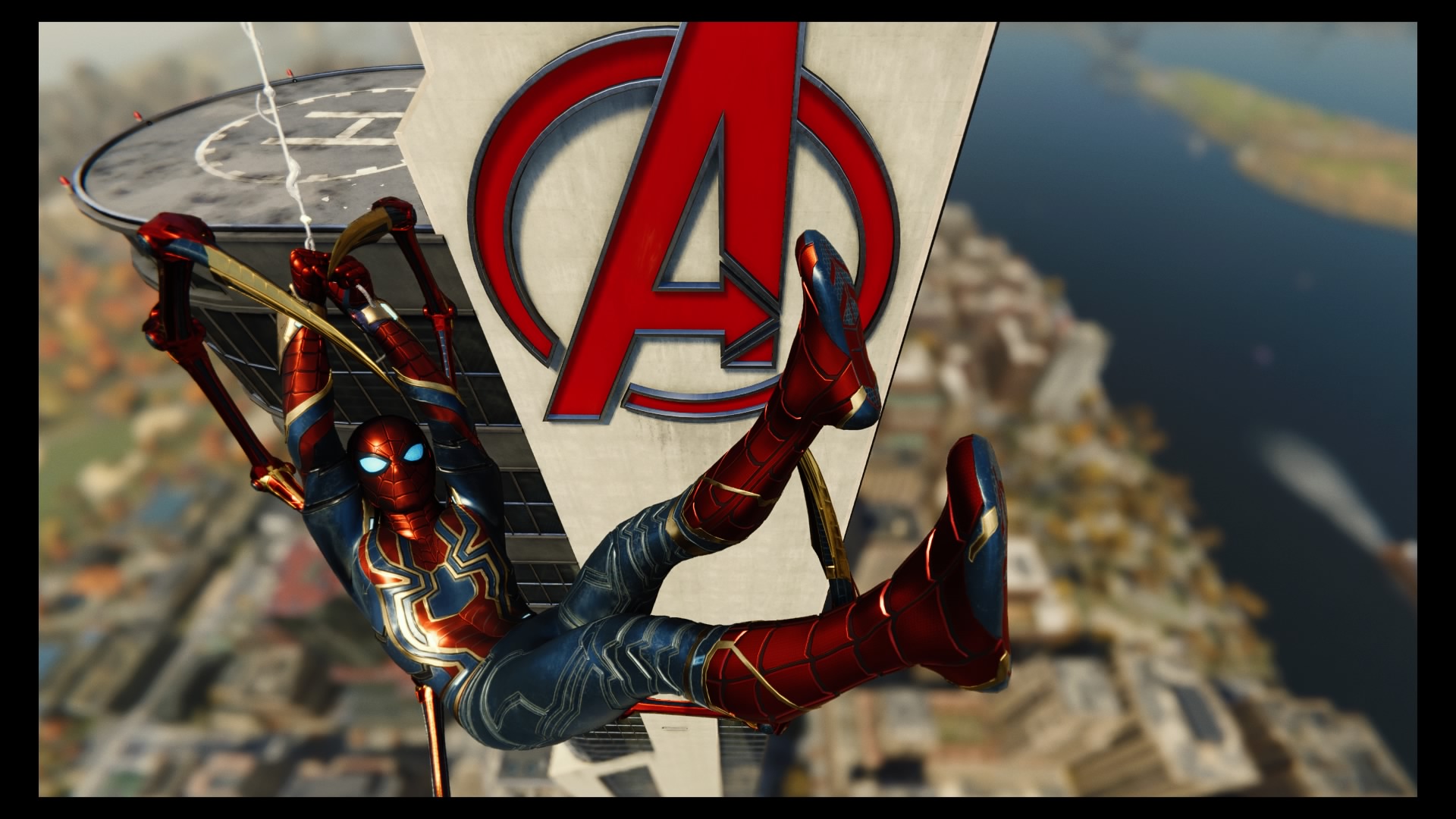
Paying homage to Avengers: Infinity War and the costume that Tony Stark gifts to Peter, the Iron Spider suit is an incredible looking Marvel that even comes with the extended metal spider legs as a bonus power.
-
#3 Last Stand Suit
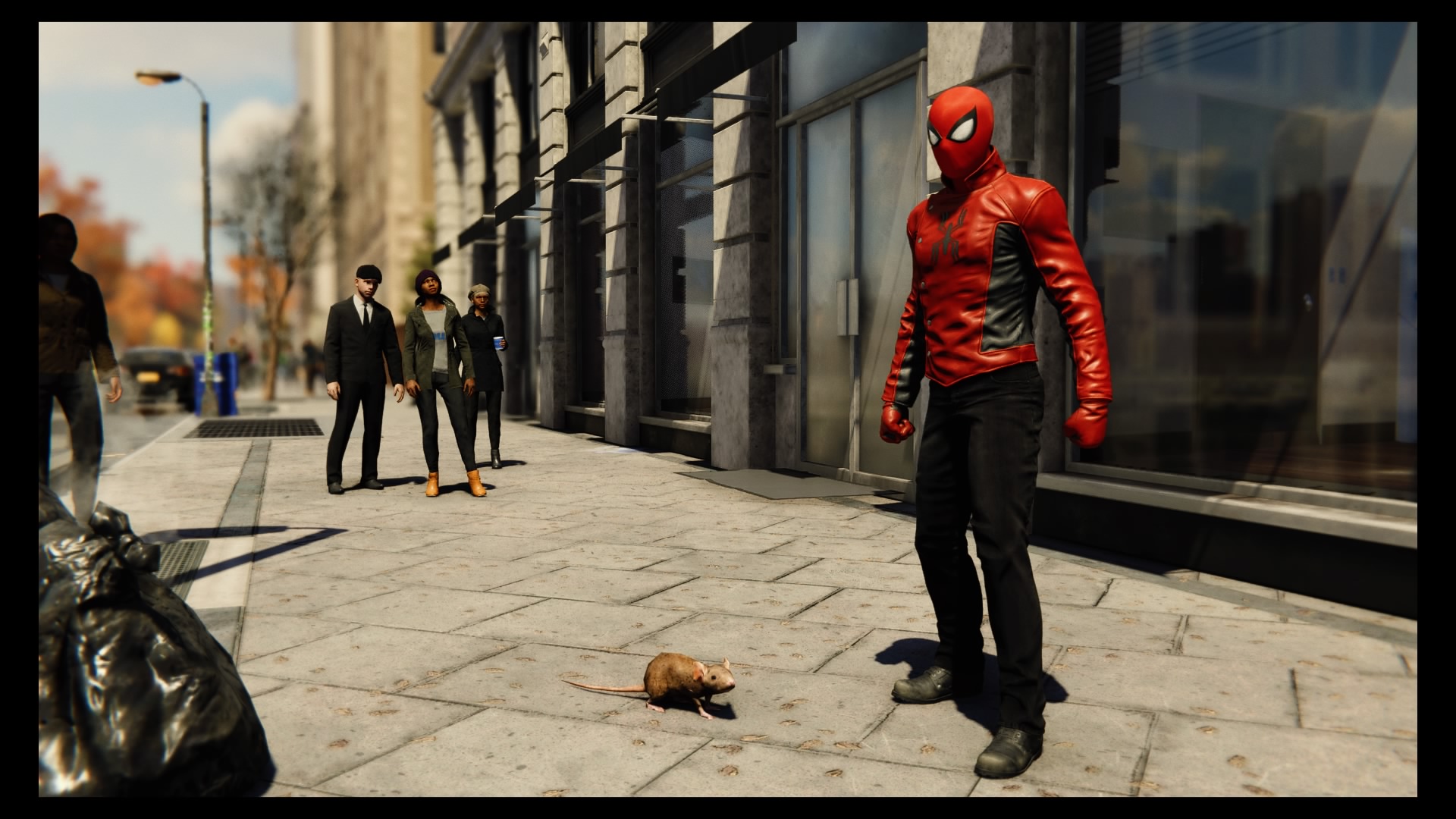
Something about the Last Stand Suit just oozes cool. Here's a guy in what amounts to black jeans and a motorcycle jacket, wearing a Spider-Man mask and fighting crime. This is a much older and darker Peter from an alternate timeline, one that's not afraid to kill. This is the outfit he is wearing when he is ultimately shot and killed by the NYPD.
-
#2 Noir Suit
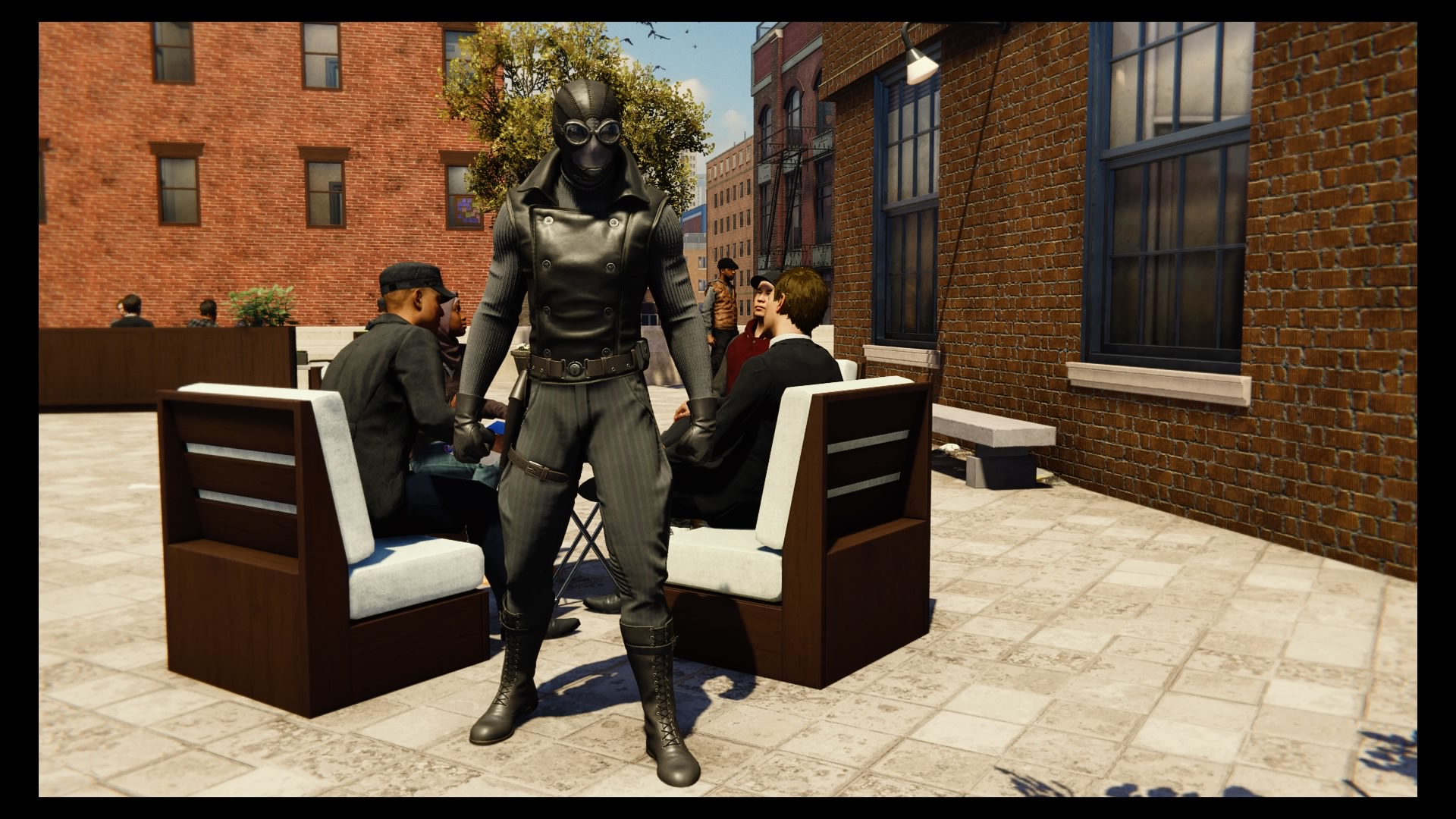
Spider-Man Noir is an alternate universe version of the Spider-Man story that takes place in the early 1900s. He uses guns for weapons and doesn't mind killing when needed, due to his dark upbringing during the Great Depression. This look for Spider-Man has always been one of my favorites, but it doesn't quite match up to number 1.
-
#1 Vintage Comic Book Suit
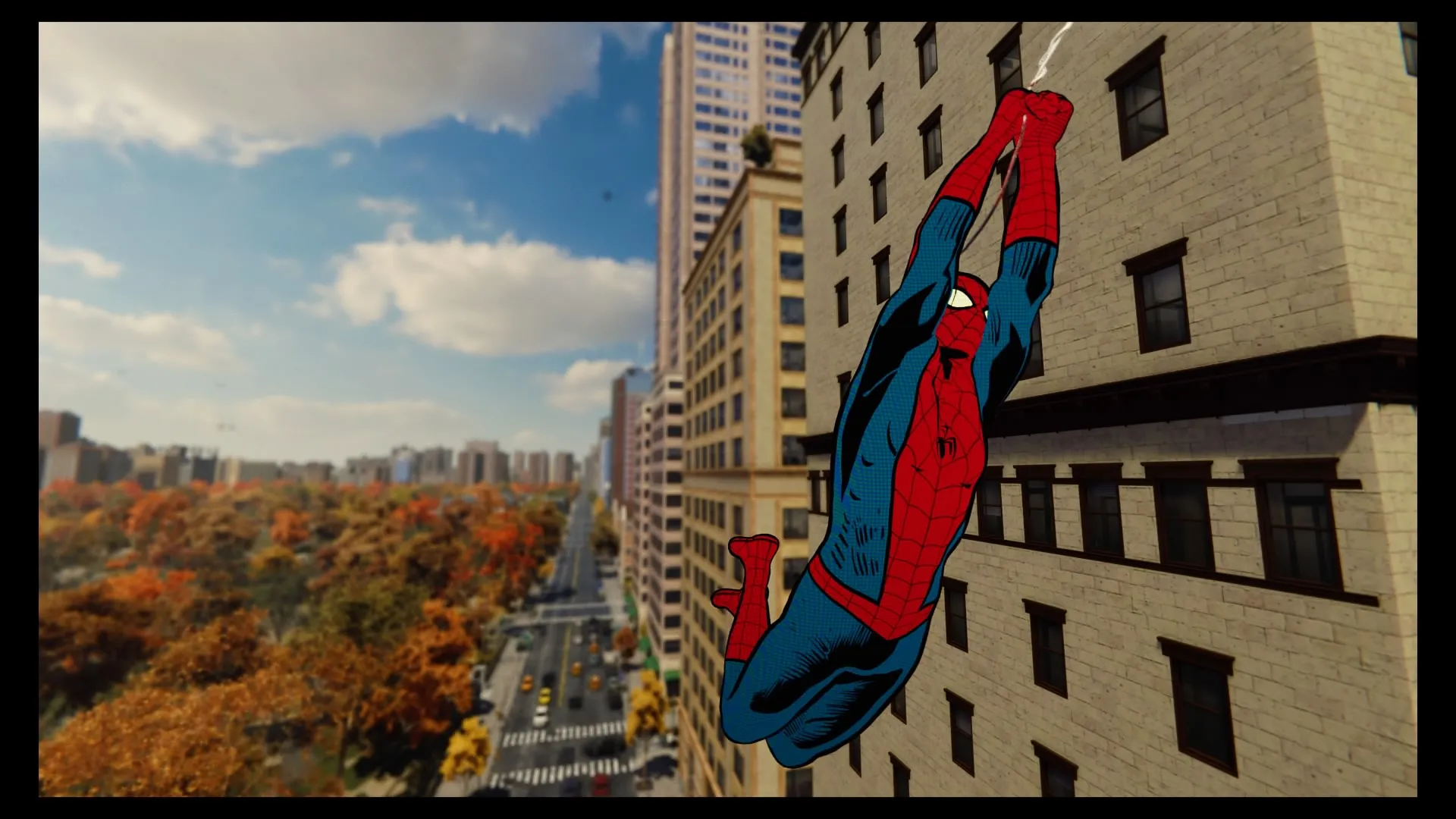
The Vintage Comic Books Suit gives Spidey a cartoony cel-shaded appearance that looks incredible against the high-resolution backdrop of New York City. It reminds me a lot of the upcoming Spider-Man: Into the Spider-Verse movie with the way the animation looks, and is an amazing addition to the game.

